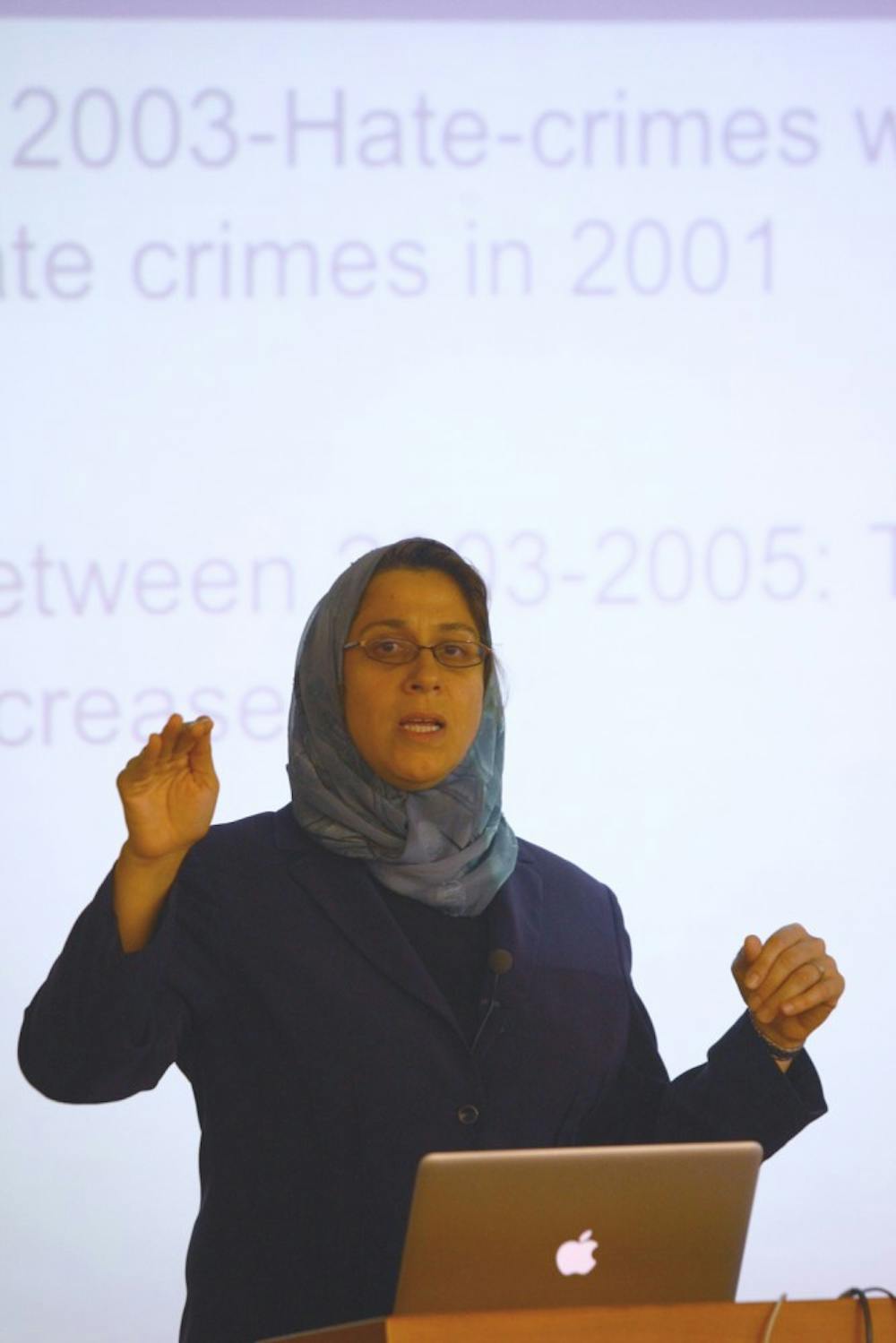Forty-three percent of Americans say they have prejudice against Muslim people, said Amaney Jamal, associate professor of politics at Princeton University.
Jamal, a Carnegie Scholar who is well known for her research on democratization and civic engagement in the Middle East, kicked off the “Citizenship, Democracy and Elections” lecture series Monday evening by discussing the implications Islamophobia has on the upcoming elections. In her address, she noted that although Islamophobia is a political issue that must be tackled, it is taboo for politicians to express their support of the Muslim-American community because anti-Islamic sentiments have become “patriotic.”
Some deem Obama’s reaction to recent protests and riots in the Middle East as supportive of extremist Arab rioters. But Jamal said the president has shifted American policy from maintaining the status quo in the Middle East—supporting governments that are already in place, even if they are oppressing their citizens—to considering Muslim public opinion in policy decisions.
“Obama has done something that is quite different from previous administrations—he’s transgressed from previous policies” Jamal said.
She said she believes that the current administration’s decision to react in this way is due to a mixture of public tensions between Arab and non-Arab Americans that are magnified by social media and the Democratic Party’s platform, which emphasizes inclusion. But, in a society where anti-Muslim jargon is considered a form of patriotism, associating with the Muslim-American community is a liability for any political party. It is politically safer for all parties to stay away from anything Muslim, she said.
The community of eight to 11 million Muslim Americans still does not feel empowered by the U.S. government, Jamal said. But the Obama administration has continually demonstrated support for the Muslim community throughout the term with acts such as his 2009 speech in Cairo, in which he expressed interest in forging a new beginning between the U.S. and Muslims.
“There is not much going on to defend Muslims at the elite level,” she said. “Many of the key Muslim-American organizations are disappointed that there aren’t more positive public statements coming out of the White House or other units of government to counter this Islamophobia.”
Some Muslims feel they have never received validation form government leaders, Jamal added. Despite feeling silenced, the Muslim American community is very engaged she reported—86 percent of Muslim-Americans say it is important to be politically active, according to a 2004 survey from Muslims in the American Public Square.
Jamal noted that three main factors cause Islamaphobia: government policies, irresponsible statements made by government officials and mainstream public opinion.
“International and domestic issues are converging” Jamal said.
In order to move forward with the current administration’s goal of supporting democracy in the Arab world, Obama has to both counter Islamophobia on the homefront and remedy anti-Americanism in the Middle East, she said.
“Our anti-Muslim sentiment fuels anti-Western views, and I think that is something that many Americans and Westerners ignore,” said freshman Christie Lawrence, who attended Jamal’s lecture. “More communication has to occur between both sides so that the media... doesn’t simply fuel these opposing views and perceptions. We forget that drone strikes kill citizens over there almost daily, and although we don’t publicize those events, they do. On the opposite end, we don’t publicize the Libyans who died trying to save [Ambassador Chris Stevens].”
As the lecture concluded, the audience, which included Carol Durham, clinical associate professor of nursing at the Univeristy of North Carolina at Chapel Hill, debated whether or not treatment of the Muslim community in America will get better if Obama wins a second term. Sinno will be speaking as part of the lecture series this Thursday evening.
“I found it a very useful program,” Durham said “She was direct, informative and clear in her opinions.”
Correction: An earlier version of this article said that Abdulkader Sinno, associate professor of political science and Middle Eastern studies at Indiana University, was present in the audience and that he would giving a lecture at Duke Thursday, Oct. 4. He did not attend the event and will in fact speak at Duke Oct. 18. The Chronicle regrets the error.
Get The Chronicle straight to your inbox
Signup for our weekly newsletter. Cancel at any time.

